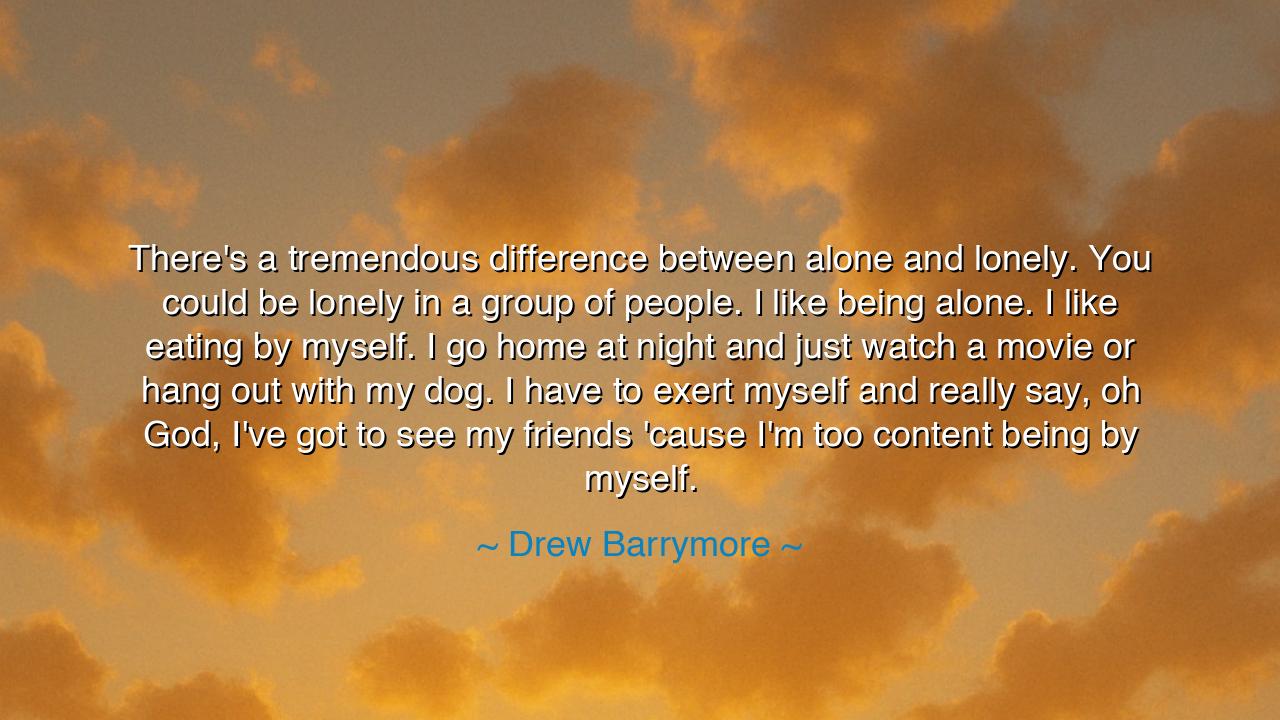
There's a tremendous difference between alone and lonely. You
There's a tremendous difference between alone and lonely. You could be lonely in a group of people. I like being alone. I like eating by myself. I go home at night and just watch a movie or hang out with my dog. I have to exert myself and really say, oh God, I've got to see my friends 'cause I'm too content being by myself.






“There’s a tremendous difference between alone and lonely. You could be lonely in a group of people. I like being alone. I like eating by myself. I go home at night and just watch a movie or hang out with my dog. I have to exert myself and really say, oh God, I’ve got to see my friends ‘cause I’m too content being by myself.”
Thus spoke Drew Barrymore, a woman who has walked through both the dazzling brightness of fame and the shadowed valleys of solitude. Her words, though spoken in the language of our modern age, carry the wisdom of the ancients — for she has touched the heart of an eternal truth: that being alone and being lonely are not the same. To be alone is to dwell in one’s own company and find peace there; to be lonely is to stand among many and still feel unseen. The former gives strength, the latter brings sorrow. Between them lies the great difference between fulfillment and emptiness.
In the lives of the wise, solitude is not a void but a garden — a place where the soul blooms in its own season. Yet loneliness, though it often wears the same face, is a desert. Many walk surrounded by crowds, yet their hearts are barren, untouched, unheard. Barrymore, having lived her life in the public eye, knows well this paradox. From childhood, she was never alone — yet there were times she was profoundly lonely. Her later discovery — that being alone could bring her peace rather than pain — was not just personal, but universal. It is the moment when one stops fleeing from silence and begins to listen to it.
This truth was known even to the ancients. The philosopher Epicurus taught that happiness could only be found in self-sufficiency — in enjoying one’s own company and the simple pleasures of life. He would have smiled to hear Barrymore speak of her joy in eating alone, watching movies, and sitting quietly with her dog. These are not acts of withdrawal, but of contentment. The one who can find peace in small moments is richer than the one who depends on noise and company to escape their own thoughts. To be content in solitude is to have conquered the need for constant validation; it is to have discovered the inner fountain that never runs dry.
Consider the story of Nikola Tesla, the solitary genius whose mind lit the modern world. He once said, “The mind is sharper and keener in seclusion and uninterrupted solitude. Originality thrives in isolation.” Though he walked alone, he was never lonely, for he communed with his thoughts, his dreams, his inventions. The world saw him as reclusive, yet in truth he was in deep dialogue with the universe. His solitude gave birth to the electricity that now binds the world together — a perfect symbol of how being alone can bring light to all.
Barrymore’s words echo this same balance. She admits that sometimes she must exert herself to rejoin others, to step out of her sanctuary. This too is wisdom. For solitude, though holy, must never become a fortress. Even the sages who dwelled in caves returned to the world to teach what they had learned. The goal is not to reject society, but to carry the peace of solitude into it — to meet others not from need, but from fullness. To enjoy one’s own company is a victory; to share it with others without losing oneself is mastery.
There is a heroic honesty in Barrymore’s confession. In a world that fears stillness, she dares to say, “I am content by myself.” This is not arrogance — it is wholeness. The ancients would call it ataraxia, the calm of a soul at rest. Such a person no longer clings to the crowd to feel alive. They can walk alone at sunset, eat quietly at a table for one, and still feel surrounded by the pulse of life. For to one who has befriended the self, even silence sings.
The lesson of her words is this: seek not to escape solitude, but to understand it. Learn to dine alone without sorrow, to walk alone without fear, to listen to your own voice without judgment. When you can do this, you will no longer be at the mercy of loneliness, for you will have found your true companion — yourself. Yet do not let solitude harden into isolation; when the heart is full, open it again to others. Let friendship and solitude alternate like breath — inhale and exhale, giving and receiving.
So, my child of the future, remember Drew Barrymore’s wisdom: alone is not lonely. Loneliness comes when we forget who we are; solitude heals when we remember it. Be brave enough to sit with yourself, to eat in silence, to walk in peace. For in that stillness, you will discover the most faithful friend you will ever have — the quiet joy of your own company. And from that inner companionship will grow a love so steady that no crowd can amplify it, and no absence can diminish it.






AAdministratorAdministrator
Welcome, honored guests. Please leave a comment, we will respond soon